HVAC Companies Kelso
Best HVAC Companies in Kelso
Receive 3 FREE HVAC Services quotes for your project today! Compare profiles, reviews, accreditations, portfolio, etc... and choose the best deal.
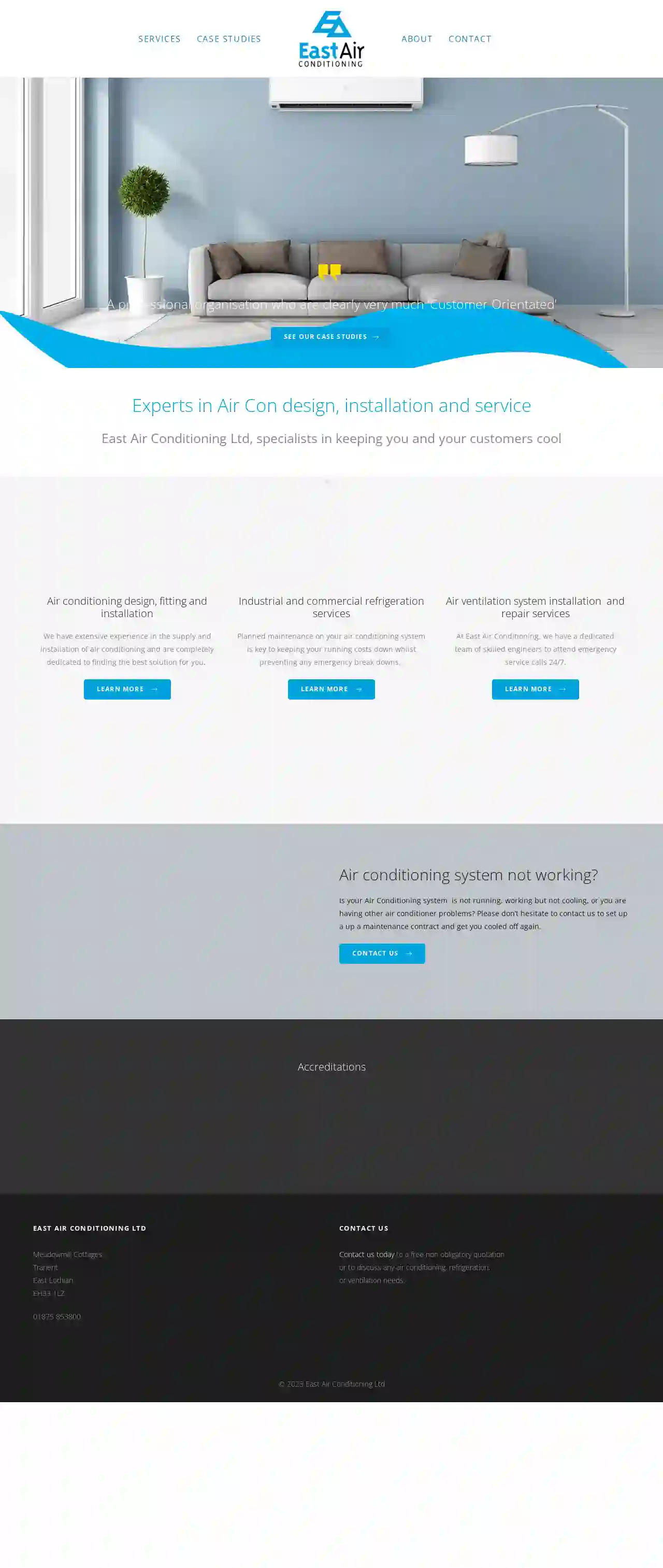
East Air Conditioning Ltd
52 reviewsMeadowmill Cottages, Tranent, EH33 1LZ, GBA professional organisation who are clearly very much ‘Customer Orientated’. We have worked with East Air Conditioning for 14 years and have been continually impressed with the level of service and commitment to quality shown. Experts in Air Con design, installation and service. East Air Conditioning Ltd, specialists in keeping you and your customers cool. Air conditioning design, fitting and installation. We have extensive experience in the supply and installation of air conditioning and are completely dedicated to finding the best solution for you. Planned maintenance on your air conditioning system is key to keeping your running costs down whilst preventing any emergency break downs. Air ventilation system installation and repair services. At East Air Conditioning, we have a dedicated team of skilled engineers to attend emergency service calls 24/7. Is your Air Conditioning system not running, working but not cooling, or you are having other air conditioner problems? Please don’t hesitate to contact us to set up a maintenance contract and get you cooled off again.
- Services
- Why Us?
- Gallery
Get Quote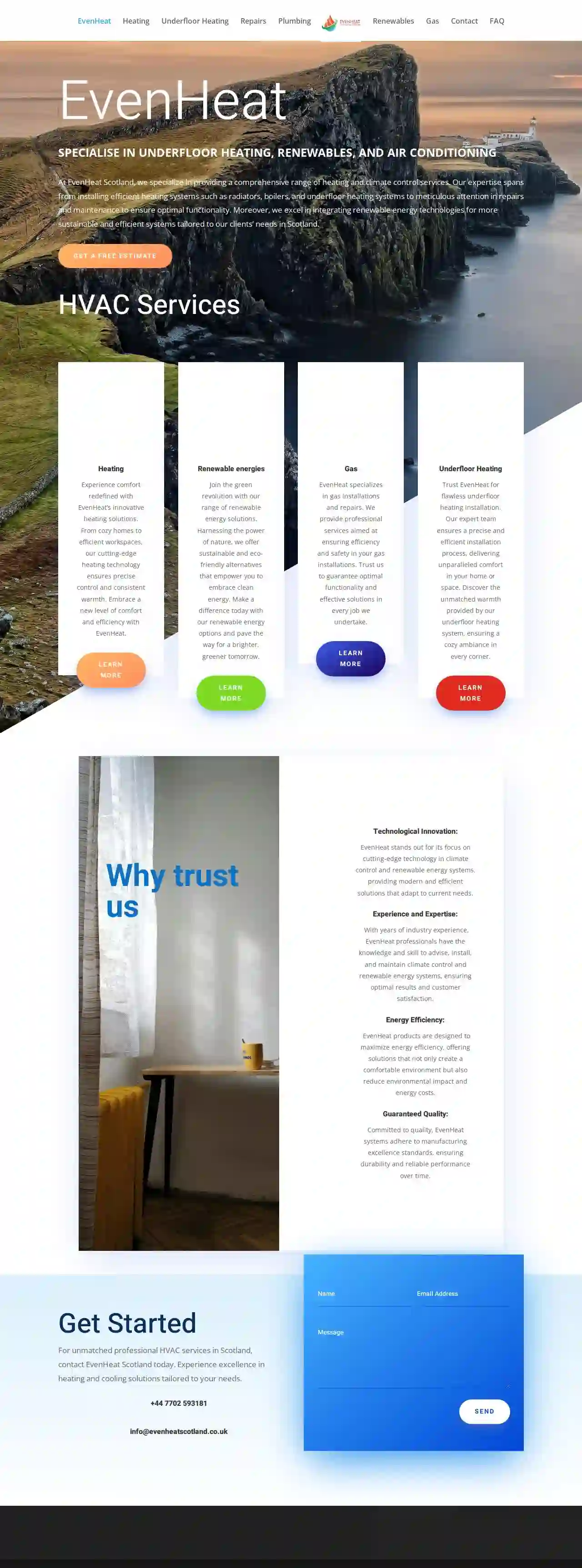
EvenHeat Scotland
56 reviewsKirkcaldy, GBAt EvenHeat Scotland, we specialize in providing a comprehensive range of heating and climate control services. Our expertise spans from installing efficient heating systems such as radiators, boilers, and underfloor heating systems to meticulous attention in repairs and maintenance to ensure optimal functionality. Moreover, we excel in integrating renewable energy technologies for more sustainable and efficient systems tailored to our clients’ needs in Scotland. Experience comfort redefined with EvenHeat’s innovative heating solutions. From cozy homes to efficient workspaces, our cutting-edge heating technology ensures precise control and consistent warmth. Embrace a new level of comfort and efficiency with EvenHeat. Join the green revolution with our range of renewable energy solutions. Harnessing the power of nature, we offer sustainable and eco-friendly alternatives that empower you to embrace clean energy. Make a difference today with our renewable energy options and pave the way for a brighter, greener tomorrow. EvenHeat specializes in gas installations and repairs. We provide professional services aimed at ensuring efficiency and safety in your gas installations. Trust us to guarantee optimal functionality and effective solutions in every job we undertake. Trust EvenHeat for flawless underfloor heating installation. Our expert team ensures a precise and efficient installation process, delivering unparalleled comfort in your home or space. Discover the unmatched warmth provided by our underfloor heating system, ensuring a cozy ambiance in every corner. Technological Innovation: EvenHeat stands out for its focus on cutting-edge technology in climate control and renewable energy systems, providing modern and efficient solutions that adapt to current needs. Experience and Expertise: With years of industry experience, EvenHeat professionals have the knowledge and skill to advise, install, and maintain climate control and renewable energy systems, ensuring optimal results and customer satisfaction. Energy Efficiency: EvenHeat products are designed to maximize energy efficiency, offering solutions that not only create a comfortable environment but also reduce environmental impact and energy costs. Guaranteed Quality: Committed to quality, EvenHeat systems adhere to manufacturing excellence standards, ensuring durability and reliable performance over time. For unmatched professional HVAC services in Scotland, contact EvenHeat Scotland today. Experience excellence in heating and cooling solutions tailored to your needs.
- Services
- Why Us?
- Gallery
Get Quote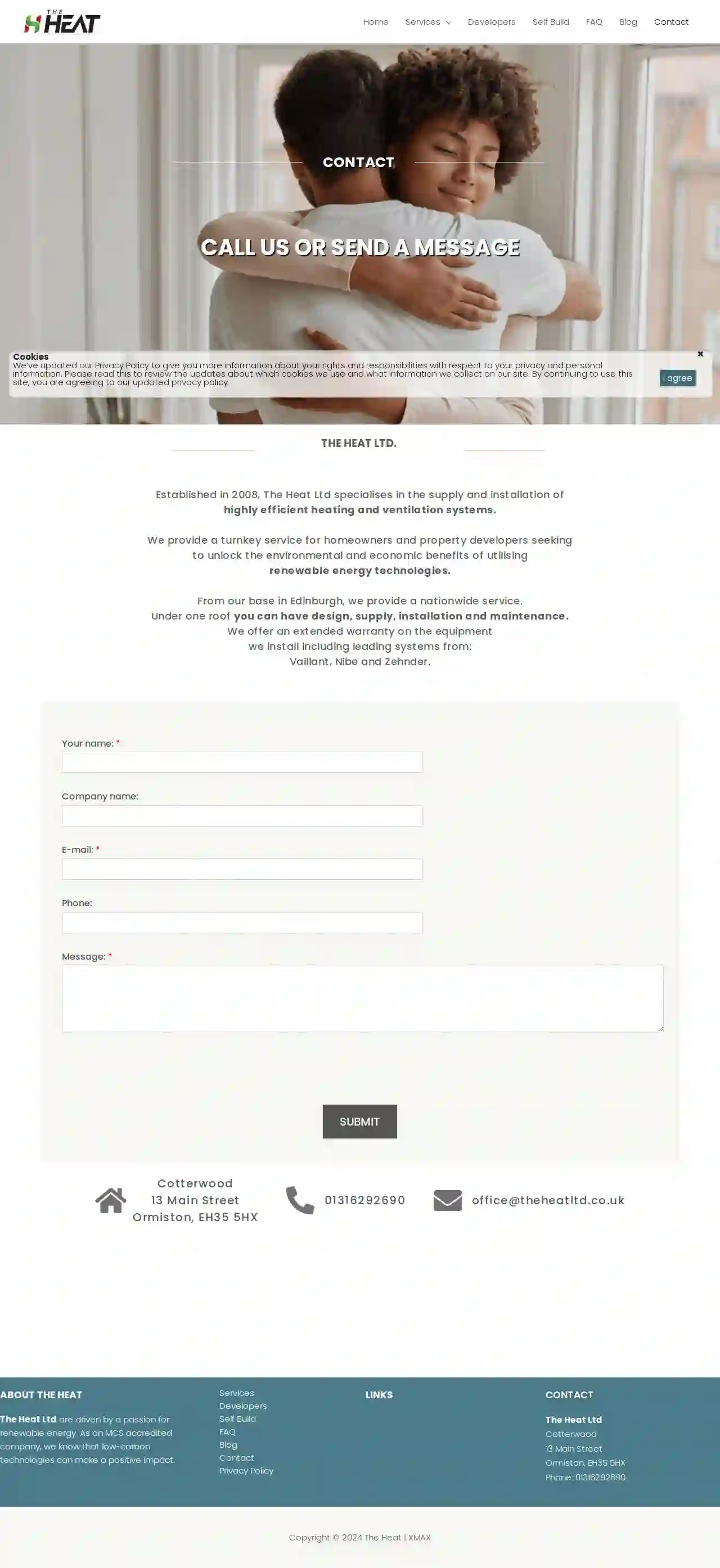
The Heat Ltd
Cotterwood 13 Main Street, Ormiston, EH35 5HX, GBEstablished in 2008, The Heat Ltd specialises in the supply and installation of highly efficient heating and ventilation systems. We provide a turnkey service for homeowners and property developers seeking to unlock the environmental and economic benefits of utilising renewable energy technologies. From our base in Edinburgh, we provide a nationwide service. Under one roof you can have design, supply, installation and maintenance. We offer an extended warranty on the equipment we install including leading systems from Vaillant, Nibe and Zehnder.
- Services
- Why Us?
- Gallery
Get Quote
Chris Dadley Plumbing and Heating
Hawthorn House, Penrith, Ca11 9tg, GBChris Dadley Plumbing & Heating is a trusted and reliable plumbing and heating company serving Penrith and the surrounding areas of Cumbria. With over 20 years of experience, we pride ourselves on providing a wide range of high-quality services, including renewable heating systems, underfloor heating, and bathroom installations. Our team of highly skilled and experienced plumbers is dedicated to delivering exceptional workmanship and customer satisfaction. We are committed to offering a hassle-free and affordable service, ensuring that your needs are always our top priority. Whether you require a simple repair or a complete installation, Chris Dadley Plumbing & Heating is your go-to solution for all your plumbing and heating needs.
- Services
- Why Us?
- Accreditations
- Our Team
- Testimonials
- Gallery
Get Quote
Richard Irvin FM Limited
2.115 reviewsNasmyth Place, Hillington Park, 3 Centura Court, Glasgow, G52 4PR, GBRichard Irvin FM is a leading provider of technical FM services, maintaining, repairing, replacing, and improving 9,000 commercial properties and 56,000 domestic properties nationwide. They are committed to delivering excellence in the industry, driven by a set of core values that guide their decisions and actions. Richard Irvin FM believes in transparency, honesty, and a relentless pursuit of excellence. They are dedicated to providing tailored solutions to meet the unique needs of each client, ensuring safety, compliance, and sustainability. With a nationwide network of offices and a team of experienced professionals, Richard Irvin FM is dedicated to creating safer, smarter, and greener places to live and work.
- Services
- Why Us?
- Accreditations
- Gallery
Get Quote
M C G Heating & Plumbing
58 reviewsKirkcaldy, GBMcG Heating & Plumbing is a trusted Domestic gas Heating Engineer with over 35 years of experience in the trade. We have expanded over the years and moved into the commercial industry, gaining extensive experience in large scale pipe fitting & welding. This skill set is highly sought after by commercial Building & Facility maintenance companies. We specialise in commercial contractor projects, but our expertise allows us to carry out a variety of projects efficiently with a high standard of professionalism and attention to detail.
- Services
- Why Us?
- Accreditations
- Our Team
- Gallery
Get Quote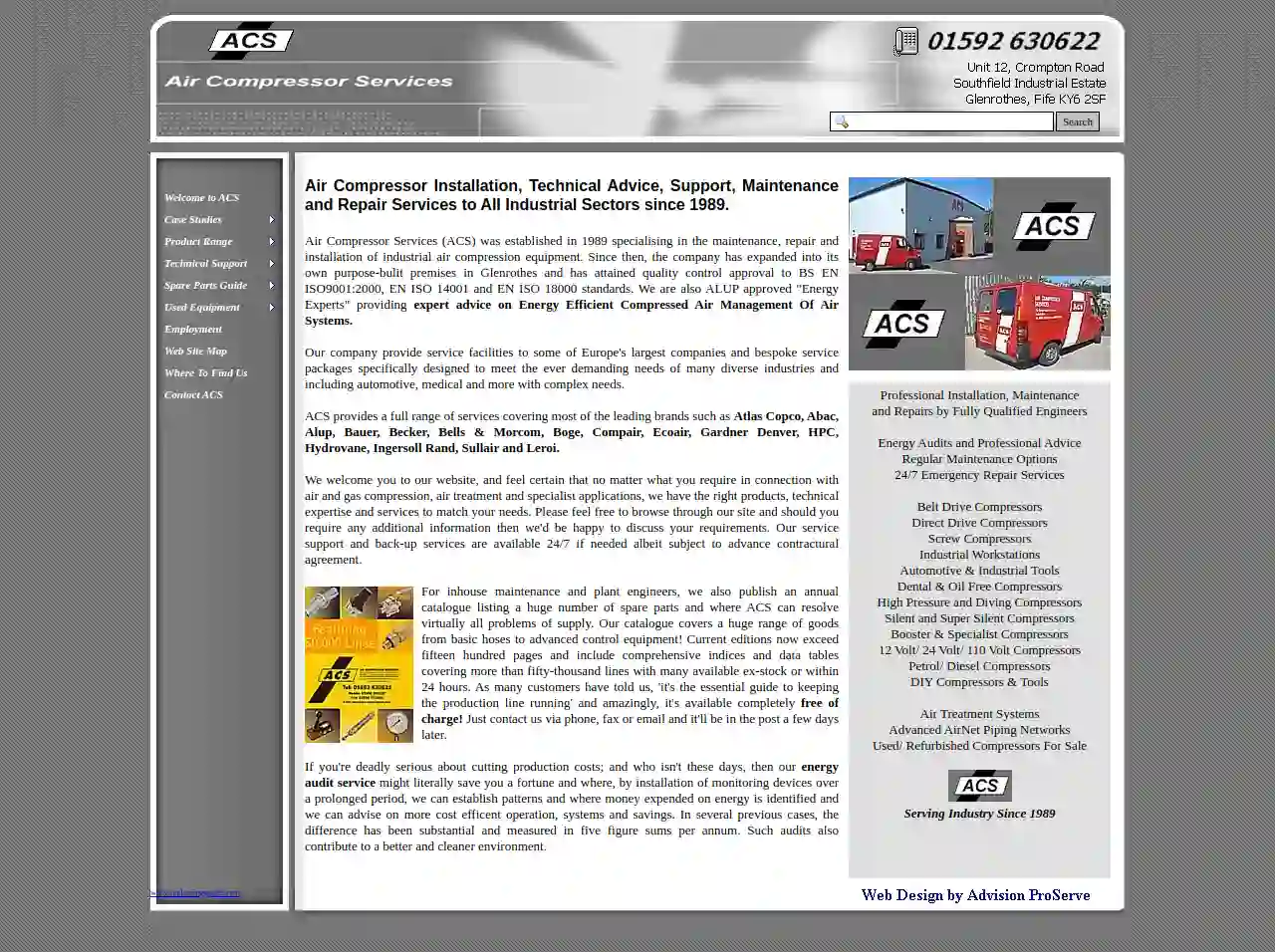
Air Compressor Services
58 reviewsGlenrothes, Fife, Unit 1, Glenrothes Business Park, KY7 3XJ, GBAir Compressor Services (ACS) was established in 1989 specialising in the maintenance, repair and installation of industrial air compression equipment. Since then, the company has expanded into its own purpose-built premises in Glenrothes and has attained quality control approval to BS EN ISO9001:2000, EN ISO 14001 and EN ISO 18000 standards. We are also ALUP approved "Energy Experts" providing expert advice on Energy Efficient Compressed Air Management Of Air Systems. Our company provides service facilities to some of Europe's largest companies and bespoke service packages specifically designed to meet the ever-demanding needs of many diverse industries and including automotive, medical and more with complex needs. ACS provides a full range of services covering most of the leading brands such as Atlas Copco, Abac, Alup, Bauer, Becker, Bells & Morcom, Boge, Compair, Ecoair, Gardner Denver, HPC, Hydrovane, Ingersoll Rand, Sullair and Leroi. We welcome you to our website, and feel certain that no matter what you require in connection with air and gas compression, air treatment and specialist applications, we have the right products, technical expertise and services to match your needs. Please feel free to browse through our site and should you require any additional information then we'd be happy to discuss your requirements. Our service support and back-up services are available 24/7 if needed albeit subject to advance contractual agreement.
- Services
- Why Us?
- Accreditations
- Gallery
Get Quote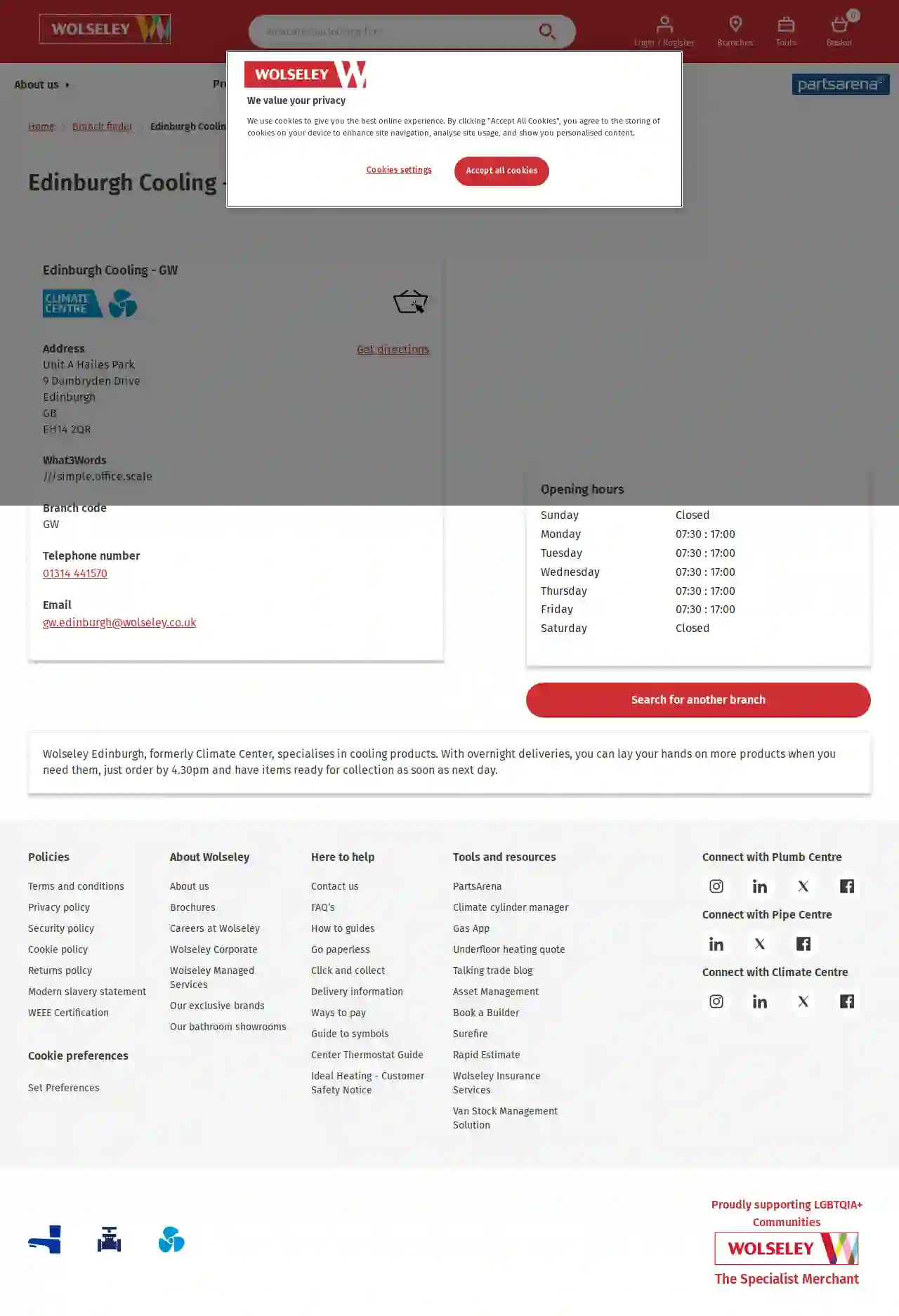
Wolseley Climate
4.911 reviews9 Dumbryden Drive, Unit A Hailes Park, Edinburgh, EH14 2QR, GBWolseley is a trusted supplier of plumbing and heating supplies. We have been working with them for many years and have always been impressed with their quality products and competitive prices. With unrivalled expert know-how and first-class customer support, Wolseley offers great value you can trust. Always delivering on their promises, they help their trade customers get the job done right first time with reliable supply of quality products.
- Services
- Why Us?
- Gallery
Get Quote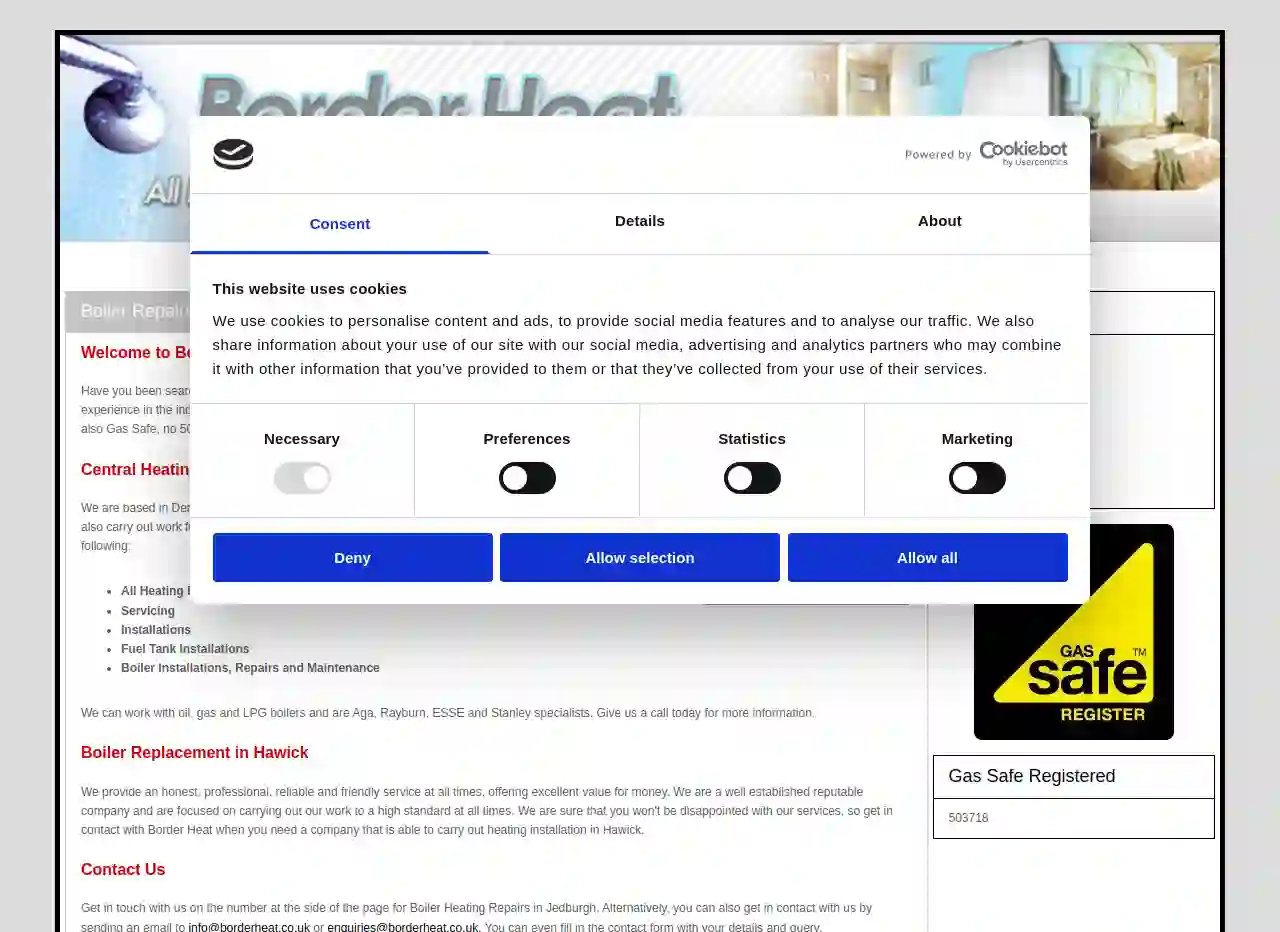
Border Heat
43 reviewsEdinburgh, GBBorder Heat is a leading provider of high-quality heating solutions for homes and businesses. With years of experience in the industry, we have a proven track record of delivering exceptional results. Our team of expert engineers is dedicated to providing our clients with the best possible service and support. We offer a wide range of heating products and services, including boiler installations, repairs, and maintenance. We are committed to providing our clients with affordable and reliable heating solutions that meet their individual needs.
- Services
- Why Us?
Get Quote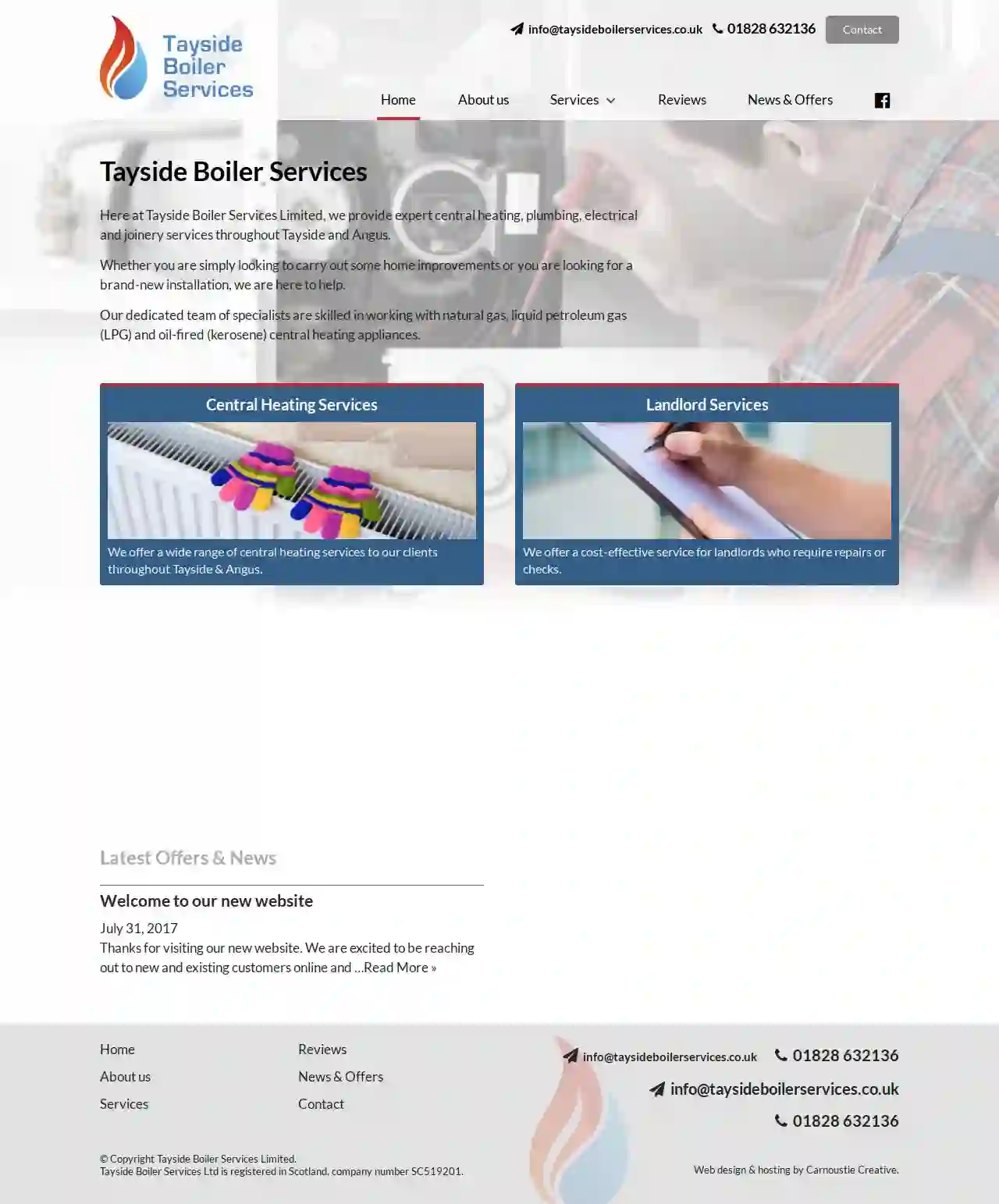
Tayside Boiler Services Limited
52 reviewsDundee, GBHere at Tayside Boiler Services Limited, we provide expert central heating, plumbing, electrical and joinery services throughout Tayside and Angus. Whether you are simply looking to carry out some home improvements or you are looking for a brand-new installation, we are here to help. Our dedicated team of specialists are skilled in working with natural gas, liquid petroleum gas (LPG) and oil-fired (kerosene) central heating appliances.
- Services
- Why Us?
- Gallery
Get Quote
Over 12,692+ HVAC Businesses on our directory
Our HVAC experts operate in Kelso and surrounding areas!
HVACCompaniesHub has curated and vetted the Best HVAC Contractors in and around Kelso. Find the most reliable contractor today.
Frequently Asked Questions About HVAC Companies
- Frequent Repairs: If your system requires repairs frequently, it may be more cost-effective to replace it.
- Age of System: HVAC systems typically last 15-20 years. If your system is nearing or beyond that age, it's likely less efficient and more prone to breakdowns.
- Increased Energy Bills: A significant rise in energy bills might mean your system is losing efficiency and needs replacement.
- Uneven Temperatures: If some rooms are too hot or too cold, it could be a sign of an inefficient HVAC system.
- Poor Indoor Air Quality: If you're experiencing allergies, dust, or other indoor air quality issues, a new HVAC system with better filtration could help.
- Strange Noises or Smells: Unusual noises or foul odors emanating from your HVAC system could signal the need for a new HVAC system.
- Regular Air Filter Replacement: Change or clean your HVAC system’s air filters regularly (every 1-3 months).
- Professional Air Duct Cleaning: Have your air ducts cleaned by professionals every few years to eliminate dust, mold, and other contaminants.
- Improve Ventilation: Ensure adequate ventilation in your home to bring in fresh air and exhaust stale air. Use exhaust fans in kitchens and bathrooms.
- Control Humidity Levels: Use a humidifier or dehumidifier to maintain optimal humidity levels and prevent mold growth.
- Clean Regularly: Dust and vacuum frequently to minimize airborne particles.
- Avoid Smoking Indoors: Smoking indoors significantly reduces IAQ.
- Use Natural Cleaning Products: Opt for natural cleaning products that don’t release harmful VOCs (volatile organic compounds).
- Monitor Indoor Air Quality: Consider using an indoor air quality monitor to track pollutant levels.
What is a SEER rating, and why is it important?
What are the signs that I need a new HVAC system?
How can I improve my home's indoor air quality?
What is an AFUE rating, and why is it important?
What is a SEER rating, and why is it important?
What are the signs that I need a new HVAC system?
- Frequent Repairs: If your system requires repairs often, it may be more cost-effective to replace it.
- Age of System: HVAC systems typically last 15-20 years. If your system is nearing or beyond that age, it's likely less efficient and more prone to breakdowns.
- Increased Energy Bills: A significant rise in energy bills might mean your system is losing efficiency and needs replacement.
- Uneven Temperatures: If some rooms are too hot or too cold, it could be a sign of ductwork problems or an undersized/aging system.
- Poor Indoor Air Quality: If you're experiencing allergies, dust, or other indoor air quality issues, a new HVAC system with better filtration could help.
- Strange Noises or Smells: Unusual noises or foul odors emanating from your HVAC system could signal a problem that requires a system replacement.
How can I improve my home's indoor air quality?
- Regular Air Filter Replacement: Change or clean your HVAC system’s air filters regularly (every 1-3 months).
- Professional Air Duct Cleaning: Have your air ducts cleaned by professionals every few years to eliminate dust, mold, and other contaminants.
- Improve Ventilation: Ensure adequate ventilation in your home to bring in fresh air and exhaust stale air. Use exhaust fans in kitchens and bathrooms.
- Control Humidity Levels: Use a humidifier or dehumidifier to maintain optimal humidity levels and prevent mold growth.
- Clean Regularly: Dust and vacuum frequently to minimize airborne particles.
- Avoid Smoking Indoors: Smoking indoors significantly reduces IAQ.
- Use Natural Cleaning Products: Opt for natural cleaning products that don’t release harmful VOCs (volatile organic compounds).
- Monitor Indoor Air Quality: Consider using an indoor air quality monitor to track pollutant levels.
